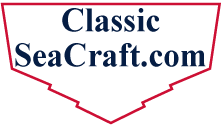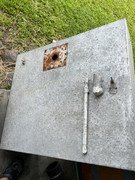
 |
|
#1
|
|||
|
|||
|
Gents: Can the fill hose for a permanent mount tank be located on the same end or area as the vent hose? Or do they need to be separated to allow for escaping air pressure? Does it matter which end the fill and vent hoses are located? Thanks
|
|
#2
|
|||
|
|||
|
Here check these out.
https://www.boatid.com/moeller-marin...SABEgLg9PD_BwE https://www.westmarine.com/buy/moell...iABEgLr9fD_BwE I found one molded with the 2 right next to each other., can’t remember where now. I’d imagine it’s not a critical design (vs a best practice), as the vent deals with vapor locking and the filler is fuel. My factory originals look like this: the fill and vent hoses are next to each other and makes the lengths required identical. but the tubes themselves enter the tanks at different points. Note the fill and vent are bow side, the pick up are stern side. I heard about a guy here on islands who put his tank in backwards with pickup facing bow. Lost prime when he had plenty left b/c he didn’t consider being on plane etc…  However, I’d guess that while it makes sense from a manufacturing perspective (cheaper materials and molds). it also makes the mistake of overfilling and it going out the vent a greater possibility. Is it necessary to separate..,no. But as you fill COULD you cause fuel to go out vent easier…seems likely. So us perfectionists would make one a different way than we would buy it and use either. Just my thoughts. I’d put the pickup towards the rear so when on plane I’m pushing fuel in direction it will naturally be forced. Filling and vent on mine are forward I think. Only concern is returns not being to close to pickup…if you have efi. |
|
#3
|
|||
|
|||
|
Casey, my two cents. I think it makes sense to have them located near each other. If the tank is not level, for whatever reason like parking on uneven ground etc, the tank is only going to fill so much, before the fuel level reaches the fuel fill, no matter how much air is still in tank.
|
|
#4
|
|||
|
|||
|
I will add my two cents based on the other responses as well.
There are two situations where you will most likely be adding fuel; on the water or on a trailer. If you are in the water the stern is going to be the lowest point and likely the same on a trailer, but not as extreme. This is where the pickups and fuel line to the motor should be with the fuel fill and vent at the bow end of the tank. The fuel tank will be able to be filled to its maximum amount this way and while under way the most of the fuel will be able to be used in case of a running out of fuel situation. At least this is what makes sense in my mind. |
|
#5
|
|||
|
|||
|
Vent right beside the filler and the pick up at the rear. Sending unit rear third, (so you'll have some reserve.)
__________________
1975 SF18/ 2002 DF140 1972 15' MonArk/ 1972 Merc 50 http://i833.photobucket.com/albums/z...photos/SC3.jpg |
 |
|
|